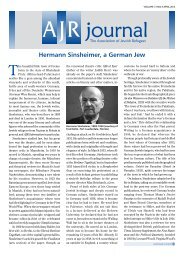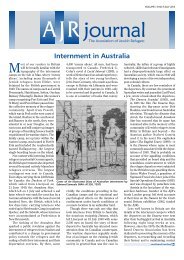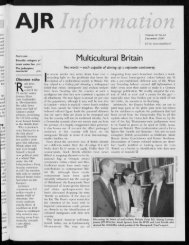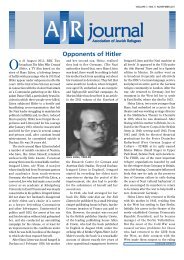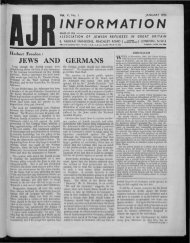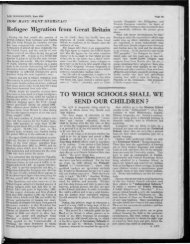INFORMATION - The Association of Jewish Refugees
INFORMATION - The Association of Jewish Refugees
INFORMATION - The Association of Jewish Refugees
Create successful ePaper yourself
Turn your PDF publications into a flip-book with our unique Google optimized e-Paper software.
Page 6 AJR <strong>INFORMATION</strong> May, 1970<br />
Kurt Grunwald (Jerusaleni)<br />
THE LAST OF BARON HIRSCH<br />
Count Arnold de Bendern (1879-1968)<br />
Count Arnold de Bendern, who died at Biarritz<br />
on October 5, 1968, at the age <strong>of</strong> 89, was<br />
probably one <strong>of</strong> the most colourful personalities<br />
on the contemporary scene. In the obituaries<br />
it was stated that he was " fabulously rich<br />
and fabulously eccentric " (" Evening Standard"),<br />
and that he "always kept the circumstances<br />
<strong>of</strong> his birth and his acquired wealth a<br />
mystery and never disclosed the name <strong>of</strong> his<br />
father" ("Herald Tribune"). It is generally<br />
agreed that the Count, born as Maurice Arnold<br />
Forrest, was the natural or adopted son<br />
<strong>of</strong> Baron Moritz Hirsch, who left him nearly<br />
£1,000,000 and valuable estates in Hungary.<br />
It was in 1888, a year after the death <strong>of</strong><br />
Lucien, Baron Hirsch's only son, that the name<br />
<strong>of</strong> Moritz Arnold Forrest-Bisch<strong>of</strong>fsheim<br />
appeared in the charter <strong>of</strong> the Hirsch Foundation<br />
in Vienna. He is mentioned among those<br />
entitled to approve or veto changes in the<br />
Foundation's statutes after the founder's death.<br />
Contemporary readers <strong>of</strong> the document probably<br />
assumed that this appointment referred<br />
to a relative <strong>of</strong> Hirsch's wife Clara, whose<br />
maiden name was Bisch<strong>of</strong>fsheim. <strong>The</strong> appointee<br />
was a nine-year-old boy, whom Clara de<br />
Hirsch, and not her husband, had apparently<br />
adopted recently, together with his younger<br />
brother Raymond (1880-1912), giving them her<br />
maiden name and making them her heirs.<br />
When the facts became known, the question<br />
as to the children's parentage remained as<br />
wide open to conjecture as it is today. On<br />
the death <strong>of</strong> Baron Hirsch in 1896, the obituaries<br />
in the Viennese press noted that lately<br />
Hirsch had always been seen accompanied by<br />
two young boys whose mother had been<br />
English or American. <strong>The</strong>ir name was given as<br />
Forreste-Bisch<strong>of</strong>fsheim. <strong>The</strong> Semi-Gotha <strong>of</strong><br />
1912 states that Amold, made an Austrian<br />
baron when he was twenty years old, on<br />
his mother's side hailed from an old French<br />
aristocratic family, the de Forrestiers. It was<br />
said at the time that the Austrian title was<br />
granted to him in consideration <strong>of</strong> Hirsch's<br />
widow having waived the debts owed by the<br />
late Crown Prince Rudolf to her husband.<br />
Educated at Eton and Christchurch, Oxford,<br />
the young Baron had inherited ample means<br />
to enable him to devote all his time to sport<br />
and politics. " Tootsie de Forrest", as he was<br />
known among his friends, excelled as a sportsman<br />
and was an early enthusiast <strong>of</strong> motoring.<br />
He participated in the intemational races,<br />
Paris-Vienna and Paris-Madrid, at the beginning<br />
<strong>of</strong> the century.<br />
In politics he was a leftist campaigner, who<br />
gave financial backing to the " Daily Herald ",<br />
then the Labour organ. He unsuccessfully contested<br />
the seat for Southport in 1910, sat<br />
on the L.C.C. for Kensington from 1910-13,<br />
and as a left-wing Liberal M.P. for West Ham<br />
North from 1911-1918. A London society<br />
weekly "<strong>The</strong> Bystander" (February 2, 1913),<br />
after referring to the sporting achievements<br />
<strong>of</strong> this good looking, popular and wealthy<br />
M,P., tells us that he had been rejected by<br />
the Reform Club, allegedly because <strong>of</strong> the role<br />
he played in the agitation for land-reform,<br />
which the Club's wealthy and respectable<br />
Whig landowners abhorred, and that Lloyd<br />
George and Winston Churchill, who had sponsored<br />
his membership, thereupon resigned<br />
from the Club. As Mr. Randolph Churchill<br />
lately recalled, his father Winston and other<br />
members <strong>of</strong> his family had been friendly with<br />
Amold de Forrest.<br />
On the outbreak <strong>of</strong> the war in 1914, the<br />
Baron, who previously had served in artillery<br />
and yeomanry regiments, joined up as a Lt,-<br />
Commander in the R.N.V.R. and was attached,<br />
until 1918, to the R,N. Armoured Car Force.<br />
In this account <strong>of</strong> Arnold's early activities<br />
we may detect similarities with Baron Hirsch's<br />
way <strong>of</strong> life : the same passionate pursuit <strong>of</strong><br />
expensive sports made possible by an ample<br />
income, combined with advanced social ideas,<br />
which led Hirsch to his large-scale philanthropy,<br />
and his " adopted " son to what was<br />
then radical politics.<br />
Yet in one sport their tastes not only differed,<br />
but apparently were violently opposed :<br />
viz. hunting. <strong>The</strong> mass killing <strong>of</strong> birds and<br />
game at Hirsch's famous hunting parties must<br />
have been a traumatic experience for young<br />
Arnold who eventually became a passionate<br />
animal lover. He campaigned against bull fighting<br />
and fought for the protection <strong>of</strong> animals<br />
and birds. At Prangins, his estate on the Lake<br />
<strong>of</strong> Geneva, he had a large aviary, about forty<br />
cats and three donkeys. He converted the<br />
rooms in the Zurich hotel in which he lived<br />
during the Second World War, into an aviary.<br />
<strong>The</strong>re were so many birds that in the end<br />
Count Bendern (as he was now called) was<br />
the only guest left in the hotel. When he presented<br />
Baron Hirsch's beautiful 400 acre hunting<br />
estate <strong>of</strong> Beauregard, which he had inherited,<br />
to the Paris municipality in 1954<br />
for the erection <strong>of</strong> workers' housing, he stipulated<br />
that no animal or bird should wilfully<br />
be destroyed, and it was apparently because<br />
<strong>of</strong> violation <strong>of</strong> this condition that he sued the<br />
municipality, though without success.<br />
Settling in Liechtenstein<br />
Count Arnold became a pacifist after the<br />
war in 1918. It seems that he, like another<br />
liberal, J. M. Keynes, disapproved <strong>of</strong> the Allied<br />
policy on Germany. Feeling increasingly out<br />
<strong>of</strong> tune with Anglo-French policy, he left<br />
Britain in 1932 and settled in Liechtenstein,<br />
Had he, as the " Evening Standard " obituary<br />
claims, the one-time Left-wing liberal, become<br />
a " violent reactionary ", and had British taxation<br />
something to do with it ? Or had he remained,<br />
as he once claimed, an advanced<br />
Radical and a convinced pacifist and adopted<br />
Liechtenstein nationality " to avoid political<br />
entanglements, because Liechtenstein has no<br />
foreign politics ? "<br />
On acquiring the nationality <strong>of</strong> the principality,<br />
he became Diplomatic Councillor to the<br />
Prince who made him Count <strong>of</strong> Bendern, a<br />
village on the Rhine in Liechtenstein. He<br />
had relinquished the use <strong>of</strong> his Austrian title<br />
in 1920, Was this because <strong>of</strong> the abolition <strong>of</strong> all<br />
titles <strong>of</strong> nobility in the new Austrian Republic,<br />
or was he in the process <strong>of</strong> breaking with<br />
the past, a break which was now to become<br />
final with the beginning <strong>of</strong> a new life in a<br />
new country under a new name ?<br />
Still, like Baron Hirsch before him, so Count<br />
de Bendein remained foot-loose, moving from<br />
one <strong>of</strong> his estates to another. We do not know<br />
what became <strong>of</strong> the estates he had inherited in<br />
Czechoslovakia and Hungary. According to<br />
one source, by 1911 he owned a magnificent<br />
estate in the Tyrol, but he mainly lived at<br />
Spencer House, St. James's. Later he spent<br />
most <strong>of</strong> his time in a villa at Biarritz, where<br />
he sponsored the Olympics, and where he died.<br />
He also owned a chateau in Switzerland (Pran<br />
gins) and a mansion at Cap Martin in the<br />
South <strong>of</strong> France. He had closed the latter down<br />
shortly before his death as the result <strong>of</strong> a<br />
row with the authorities over the tax assessment<br />
on this 12 acre property, and moved his<br />
collections <strong>of</strong> antique iurniture, paintings,<br />
cats and donkeys to Biarritz. His famous collection<br />
<strong>of</strong> paintings, probably partly inherited<br />
from his father, was, however, kept in Switzerland.<br />
It includes two Van Dykes, a Titian, a<br />
Breughel and the £125,000 Frans Hals, which<br />
was stolen and mysteriously recovered in<br />
1966/67. This collection will now be housed<br />
in a museum to be built at Bendern as the<br />
Count's bequest to the principality.<br />
Feud with Son<br />
Who are Count Arnold's heirs ? His first<br />
marriage, to the widow <strong>of</strong> the French sportsman<br />
Albert Menier and sister <strong>of</strong> Henri Letellier,<br />
editor <strong>of</strong> " Journal", was dissolved by<br />
Papal dispensation, and in 1904 he married<br />
Ethel Catherine, daughter <strong>of</strong> Lord Gerard,<br />
who died in 1966. Of their two sons, Count<br />
Alaric was designated heir. We know nothing<br />
<strong>of</strong> him but his name. A thirty year long feud<br />
with his younger son, John, remained unreconciled<br />
to the end. John had entered into<br />
two marriages which were subsequently dissolved,<br />
both <strong>of</strong> which Count Arnold had<br />
disapproved. He had won the British amateur<br />
golf championship, but refused to comply<br />
with his father's wish that he should compete<br />
for the world championship. Finally he earned<br />
his father's wrath when he joined the forces<br />
in Britain (where he was living as a businessman),<br />
to fight in a war <strong>of</strong> which his father<br />
thoroughly disapproved. He also served as<br />
special secretary to Duff Cooper, then British<br />
Ambassador to France. Count John is said<br />
to have contested in the French courts the<br />
legality <strong>of</strong> some munificent bequests his father<br />
had made in France, by which much <strong>of</strong> Count<br />
Arnold's property was vested in the Cordoma<br />
Foundation for Flora and Fauna.<br />
Count Arnold's wealth was probably also<br />
the source <strong>of</strong> his eccentricity. When Baron<br />
Hirsch died, his friends, such as Sir Ernest<br />
Cassel and Ferdinand Bisch<strong>of</strong>fsheim, took very<br />
good care <strong>of</strong> the interests <strong>of</strong> his adopted children.<br />
Yet Count Arnold himself may also<br />
have inherited the paternal gift for pr<strong>of</strong>itable<br />
investment. At the same time, the awareness<br />
<strong>of</strong> his <strong>Jewish</strong> blood may have become an increasing<br />
burden on his mind. His sub-conscious<br />
filial antagonism, which was manifested in<br />
his fanatical love <strong>of</strong> animals, may have been<br />
aggravated by an element <strong>of</strong> <strong>Jewish</strong> selfhatred.<br />
This may have made him responsive<br />
to Hitler, by whom, however, he felt himself<br />
rejected because <strong>of</strong> his paternal blood.<br />
Conscious <strong>of</strong> his origin, he preferred to<br />
spend the war years in Switzerland rather than<br />
Liechtenstein, which was uncomfortably<br />
close to German occupied Austria. His earlier<br />
break with the past, his new life under a new<br />
name, his brand <strong>of</strong> pacifism which made him<br />
repudiate his son John for joining in the war<br />
against Hitler, are all expressions <strong>of</strong> this<br />
malaise. Oedipus had not been able to overcome<br />
Laios,<br />
Count Arnold de Bendern was one <strong>of</strong> the<br />
wealthiest men in Europe, or even in the<br />
world, but he was not a happy man. He was<br />
not at peace with the world, nor was he at<br />
peace with himself.<br />
NEW LIBERAL JEWISH CONGREGATION<br />
51 Belsize Square, London, N.W.3<br />
SYNAGOGUE SERVICES<br />
are held regularly on the Eve ot Sabbath<br />
and Festivals at 6,30 p.m. and on the day<br />
at 11 a.m,<br />
ALL ARE CORDIALLY INVITED



